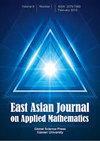Less Emphasis on Hard Regions: Curriculum Learning of PINNs for Singularly Perturbed Convection-Diffusion-Reaction Problems
IF 1.1
4区 数学
Q2 MATHEMATICS, APPLIED
引用次数: 0
Abstract
Although physics-informed neural networks (PINNs) have been successfully applied in a wide variety of science and engineering fields, they can fail to accurately predict the underlying solution in slightly challenging convection-diffusion-reaction problems. In this paper, we investigate the reason of this failure from a domain distribution perspective, and identify that learning multi-scale fields simultaneously makes the network unable to advance its training and easily get stuck in poor local minima. We show that the widespread experience of sampling more collocation points in high-loss regions hardly help optimize and may even worsen the results. These findings motivate the development of a novel curriculum learning method that encourages neural networks to prioritize learning on easier non-layer regions while downplaying learning on harder regions. The proposed method helps PINNs automatically adjust the learning emphasis and thereby facilitates the optimization procedure. Numerical results on typical benchmark equations show that the proposed curriculum learning approach mitigates the failure modes of PINNs and can produce accurate results for very sharp boundary and interior layers. Our work reveals that for equations whose solutions have large scale differences, paying less attention to high-loss regions can be an effective strategy for learning them accurately.减少对困难区域的重视:奇异扰动对流-扩散-反作用问题的 PINNs 课程学习
尽管物理信息神经网络(PINNs)已成功应用于各种科学和工程领域,但在稍具挑战性的对流扩散反应问题中,它们可能无法准确预测底层解。在本文中,我们从领域分布的角度研究了这种失败的原因,发现同时学习多尺度场会使网络无法推进其训练,并容易陷入较差的局部极小值。我们还发现,在高损失区域采样更多配位点的普遍经验不仅无助于优化,甚至会使结果更糟。这些发现促使我们开发了一种新的课程学习方法,鼓励神经网络优先学习较容易的非层区域,而淡化较难区域的学习。所提出的方法可以帮助 PINN 自动调整学习重点,从而促进优化过程。典型基准方程的数值结果表明,所提出的课程学习方法减轻了 PINN 的失效模式,并能为非常尖锐的边界层和内部层生成精确的结果。我们的工作揭示出,对于解具有大尺度差异的方程,减少对高损耗区域的关注是准确学习这些方程的有效策略。
本文章由计算机程序翻译,如有差异,请以英文原文为准。
求助全文
约1分钟内获得全文
求助全文
来源期刊

East Asian Journal on Applied Mathematics
MATHEMATICS, APPLIED-
CiteScore
2.60
自引率
8.30%
发文量
48
期刊介绍:
The East Asian Journal on Applied Mathematics (EAJAM) aims at promoting study and research in Applied Mathematics in East Asia. It is the editorial policy of EAJAM to accept refereed papers in all active areas of Applied Mathematics and related Mathematical Sciences. Novel applications of Mathematics in real situations are especially welcome. Substantial survey papers on topics of exceptional interest will also be published occasionally.
 求助内容:
求助内容: 应助结果提醒方式:
应助结果提醒方式:


